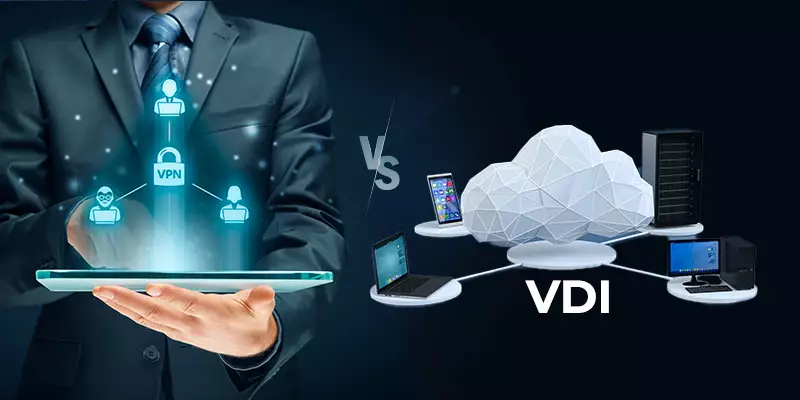
VDI vs VPN: Which Remote Access Solution Is Better for You in 2026?
VPN (virtual private network) and VDI (virtual desktop infrastructure) are two popular remote access solutions that allow users to access their work desktops and data from anywhere in the world. However, there are some key differences between the two technologies, and the best solution for you will depend on your specific needs and requirements.
In this blog post, we will compare and contrast VPN vs VDI and discuss the key factors to consider when choosing between the two. We will also provide some tips for choosing the right VPN or VDI solution for your business.
What is a VPN?
A VPN (virtual private network) encrypts your internet traffic and routes it through a secure server, making it appear as though you are connecting to the internet from a different location. This can be useful for protecting your privacy and security online, as well as for accessing geo-restricted content.
Advantages of VPN:
- Encryption: VPNs encrypt data, making it unreadable to unauthorized users.
- Privacy: VPNs mask users’ IP addresses, enhancing online anonymity.
- Accessibility: VPNs allow users to access region-restricted content and applications securely.
You may also like: Top 10 Emerging Cybersecurity Challenges
What is VDI?
VDI (virtual desktop infrastructure) is a technology that allows you to create and manage virtual desktops for users. Virtual desktops can be accessed from any device with an internet connection, making them a good option for remote work.
Advantages of VDI:
- Centralized Management: VDI centralized desktop management, simplifying updates and security measures.
- Scalability: VDI solutions can easily scale to accommodate a growing number of users.
- Customization: VDI environments can be customized to meet specific user requirements.
Read this also: Comprehensive Guide on Desktop Virtualization
VPN vs VDI: Key Differences
When considering a remote access solution, specifically between a VPN and VDI, there are several factors involved. Let’s understand how both VPN and VDI compare with each other on all these major talking points.
Let’s now understand all these aspects in detail:
Feature |
VPN |
VDI |
Server Interface or User Experience |
It only offers a point-to-point connection through a secured, encrypted tunnel. The processing in a VPN takes place on a user system. Therefore, in a VPN, the user experience depends entirely on the system you use (a PC or a Mac). | All users in a VDI work on their friendly Windows system interface. This enhances the comfort factor for all the users. An administrator may even allow you to customize (to some extent) your desktop interface to your liking. That way, you can give your desktop interface the look and feel that you are most accustomed to. |
System Performance |
The VPN connection can slow down significantly depending on the amount of data being transferred and the amount of encryption done. The connection speeds also depend significantly on the user’s hardware. | VDI is faster and offers better performance and user satisfaction with its compartmentalized, dedicated resources for each user. |
Costing |
It costs less as you can continue to use your existing systems with minimum installations or add-ons. | It is costlier because VDI implementation requires an additional layer of software. |
Data Security and Privacy |
Your data is protected through an encrypted tunnel. | In VDI, the system security largely depends upon the system administrator. |
Maintenance |
Once the initial setup is done, a VPN requires the least amount of maintenance among all the major remote access solutions. | Needs all updates and patches to be reflected throughout all virtual machines. |
Drawbacks |
Can slow down your internet connection. | It can be expensive to implement and maintain. |
Both VPN and VDI require huge engineering efforts to implement and get going. With a VDI, you need to think about IOPS (Input/Output operations per second), disk images, servers, printing, application layering, user profiles, login times, number of GPUs, monitors, bandwidth, and pixels, user updates, patches, etcetera. It takes great effort to understand it all.
Which is Best for You: VPN vs VDI?
The best solution for you will depend on your specific needs and budget. If you are looking for a way to protect your privacy and security online, or if you need to access geo-restricted content, then a VPN is a good option. If you are looking for a way to provide a secure and consistent desktop environment for remote workers, then VDI is a good option.
Here are some factors to consider when choosing between VPN and VDI:
- Your budget: VPN is generally less expensive to implement and maintain than VDI.
- Your security needs: VDI is generally more secure than VPN, as it creates a completely isolated desktop environment for each user.
- Your performance needs: VDI can offer better performance than VPN, as it uses dedicated hardware resources to create virtual desktops.
- Your scalability needs: VDI is more scalable than VPN, as you can easily add or remove virtual desktops as needed.
Facts About VPN and VDI
VPN:
According to a recent survey by Global Workplace Analytics, 56% of employees now work remotely at least some of the time.
The global VPN market is expected to reach $95 billion by 2028.
Some popular VPN providers include NordVPN, ExpressVPN, and Surfshark.
VDI:
The virtual desktop infrastructure (VDI) market is estimated to grow at a CAGR of 11.39% between 2022 and 2027.
The size of the market is forecast to increase by USD 6,045.55 million.
Some popular VDI providers include Citrix, VMware, and Amazon WorkSpaces.
Conclusion
We understood VPN and VDI through this post, but it remains uncertain which of the two is a better remote work solution. There is, in fact, no certain answer to this question. It is more like “to each his own”. Every business is different; therefore, the things that you consider essential for your business may not be that important for others, and vice-versa.
However, if you are looking for a solution for a small number of users and with limited requirements, a VPN is simpler and more cost-efficient for you. But, if you want the solution for a larger workforce and have graphics processing or mobile requirements, then a VDI is more suited for your business.
FAQ
Is VDI the same as VPN?
No. VDI (Virtual Desktop Infrastructure) delivers a full virtual desktop hosted in the cloud or a data center. VPN (Virtual Private Network) only creates a secure tunnel to access a private network.
VDI = full remote desktop.
VPN = secure connection to your company network.
Is Citrix a VDI or VPN?
Citrix is primarily VDI. Citrix Virtual Apps and Desktops delivers virtual desktops and apps to users. While Citrix does include secure access features, it is not a VPN, its main role is hosting and delivering virtual desktops.
Is Azure VDI better than VPN?
For most modern businesses, yes. Azure VDI (Azure Virtual Desktop) offers:
- Faster performance
- Better scalability
- Centralized management
- Stronger security controls
- Consistent remote desktop experience
VPNs are cheaper but rely on the user’s local hardware and can slow down under heavy workloads.
What is the difference between a virtual network and a VPN?
A virtual network is an internal network created in the cloud (like Azure VNet or AWS VPC) that behaves like an on-prem LAN. A VPN connects a remote device or remote network to that virtual network over an encrypted tunnel.
Virtual network = the environment.
VPN = the secure connection into that environment.






